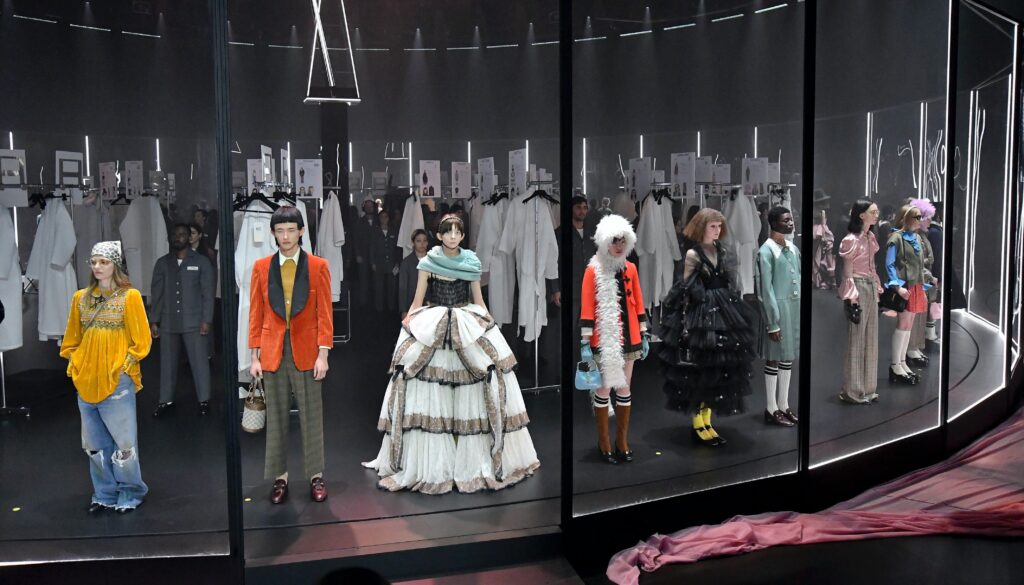Shared from www.businessoffashion.com
The Gang’s All Back
- Milan Fashion Week runs from Feb. 22 to 28
- Gucci and Bottega Veneta are back on the schedule after showing elsewhere for much of the pandemic
- Bottega Veneta’s Matthieu Blazy and Diesel’s Glenn Martens will stage their first physical shows for Milan Fashion Week
After two-plus years of globetrotting shows, short films, video games and social media hijinks, the rebellion against fashion week appears to be over. The Milan Fashion Week schedule is packed, with Fendi, Prada, Versace and other mainstays joined by Bottega Veneta, Gucci and a handful of other holdouts that used the pandemic’s disruption to experiment with alternative forms to the conventional fashion show. Even Armani, which cancelled its January men’s and couture week shows during the Omicron surge, is returning to Milan this week.
On paper, then, the schedule is back to its former glory. Will the reception be different though? The pandemic accelerated the transition of fashion week from an industry event to a consumer-facing one. Brands care even more about how a show pops on social media than they did before. The shows that produce a viral moment by casting movie stars as models or conceiving a particularly inventive set are the most successful, sometimes independent of the quality of the clothes themselves. As Diesel’s Glenn Martens put it to BoF’s Tim Blanks last summer, the point of physical shows is to bring “a bit of fashion drama.”
The Bottom Line: In New York and London, the narrative at fashion week tends to involve plenty of handwringing about the industry’s future. Not so in Milan, where the biggest brands are riding a collective hot streak. The most-anticipated shows are all about building momentum for another year of record sales, whether it’s Martens’ first Diesel show at Milan Fashion Week, Gucci’s next reinvention, the next chapter in Miuccia Prada and Raf Simons’ partnership or Matthieu Blazy’s debut at Bottega.
Farfetch’s Future
- Farfetch reports fourth-quarter and full-year results on Feb. 24
- The online luxury marketplace’s revenue disappointed in the third quarter, raising the stakes for its holiday sales
- Farfetch recently acquired the beauty retailer Violet Grey and is in talks with Richemont to take a stake in Yoox Net-a-Porter
Luxury sales are booming, but unfortunately for Farfetch, too many shoppers are opting to buy their Bottega bags and Saint Laurent boots in person. The marketplace’s third-quarter results missed expectations, and the company needs a big holiday to prove it has retained all those new customers who started shopping online during the pandemic. Investors are sceptical: Farfetch shares are down more than 50 percent this year, and are closing in on lows not seen since spring 2020. Shopify’s recent earnings miss is ominous for other e-commerce platforms, though Mytheresa’s solid results this past week offer some hope luxury may be at least partially exempt from wider shopping trends.
The Bottom Line: Farfetch is never one to sit still and let itself be buffeted by market forces. It said in January it was acquiring Violet Grey, a deal meant to kickstart a major push into the beauty category. But the real question is over the status of talks with Richemont to take a stake in Net-a-Porter, which would mark a fundamental shift in the luxury e-commerce landscape.
Responsible Supply Chains
- The Organisation for Economic Co-operation and Development (OECD) will hold a virtual forum on due diligence in garment supply chains from Feb. 21 to 25
- Disruptions caused by the pandemic have contributed to increased wage theft and worsening working conditions
- Regulators are more closely scrutinising supply chains, and brands face pressure from consumers to disclose more about how clothes are made
While the pandemic shone a spotlight on bad labour practices in fashion’s supply chain, two years on not much has changed. There’ve been reports of record wage theft, worsening working conditions and mounting risks of modern slavery. At the same time, governments are playing a bigger role in policing supply chains, whether it’s the US ban on importing goods from China’s Xinjiang region or pending legislation in New York, putting a greater spotlight on fashion brands’ manufacturing practices. What fashion can do about those issues will be in focus this week at the OECD’s annual forum on responsible supply chains. The digital event will bring together members of government, business, trade unions and civil society to share learnings and discuss best practices.
The Bottom Line: Regulators are demanding big brands take more responsibility for labour rights abuses in their supply chain and the topic of due diligence is only likely to keep moving up companies’ agendas.
Sarah Kent contributed to this item.
The Week Ahead wants to hear from you! Send tips, suggestions, complaints and compliments to brian.baskin@businessoffashion.com.
Join BoF Professional to get access to the exclusive insight and analysis that keeps you ahead of the competition. Subscribe to BoF Professional here.
Images and Article from www.businessoffashion.com

